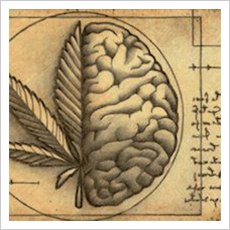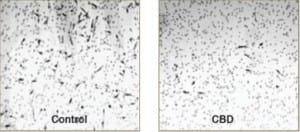
The Endocannabinoid System
 Cannabis has been at the center of one of the most exciting—and underreported—developments in modern science. Research on marijuana’s effects led directly to the discovery of a hitherto unknown biochemical communication system in the human body, the Endocannabinoid System, which plays a crucial role in regulating our physiology, mood, and everyday experience.
Cannabis has been at the center of one of the most exciting—and underreported—developments in modern science. Research on marijuana’s effects led directly to the discovery of a hitherto unknown biochemical communication system in the human body, the Endocannabinoid System, which plays a crucial role in regulating our physiology, mood, and everyday experience.
The discovery of receptors in the brain that respond pharmacologically to cannabis—and the subsequent identification of endogenous cannabinoid compounds in our own bodies that bind to these receptors—has significantly advanced our understanding of human biology, health, and disease.
It is an established scientific fact that cannabinoids and other components of cannabis can modulate many physiological systems in the human brain and body. Cannabinoids are chemical compounds that trigger cannabinoid (and other) receptors. More than 100 cannabinoids have been identified in the marijuana plant. Of these marijuana molecules, tetrahydrocannabinol (THC) and cannabidiol (CBD) have been studied most extensively. In addition to cannabinoids produced by the plant, there are endogenous cannabinoids (such as anandamide and 2AG) that occur naturally in the mammalian brain and body, as well as synthetic cannabinoids created by pharmaceutical researchers.
Extensive preclinical research—much of it sponsored by the U.S. government—indicates that CBD has potent anti-tumoral, antioxidant, anti-spasmodic, anti-psychotic, anti-convulsive, and neuroprotective properties. CBD directly activates serotonin receptors, causing an anti-depressant effect, as well.
In recent years, scientists associated with the International Cannabinoid Research Society (ICRS) have elucidated a number of molecular pathways through which CBD exerts a therapeutic impact. For example, a preclinical study by Dr. Sean McAllister and his colleagues at the California Pacific Medical Center in San Francisco report on how CBD destroys breast cancer cells by down-regulating a gene called ID-1, which is implicated in several types of aggressive cancer. Silencing the ID-1 gene is, thus, is a potential strategy for cancer treatment.
“Cannabidiol offers hope of a non-toxic therapy that could treat aggressive forms of cancer without any of the painful side effects of chemotherapy,” says McAllister.

The images above are from an experiment by McAllister testing how CBD can stop the invasion of cancer cells in human cell lines. Compare the untreated breast cancer cells on the left to the breast cancer cells destroyed by CBD on the right. Photo credit: The California Pacific Medical Center
CBD and THC Synergy
According to McAllister’s lab, the best results were obtained when CBD was administered along with THC. Several studies underscore the therapeutic advantages for combining CBD and THC—particularly for treating peripheral neuropathy, a painful condition associated with cancer, multiple sclerosis (MS), diabetes, arthritis, and other neurodegenerative ailments. Clinical research conducted by with GW Pharmaceuticals, a British company, has also shown that CBD is most effective as an analgesic when administered in combination with whole plant THC.
The above material was provided by Project CBD. Project CBD is a California-based nonprofit dedicated to promoting and publicizing research into the medical uses of cannabidiol (CBD) and other components of the cannabis plant. We provide educational services for physicians, patients, industry professionals, and the general public.
For more information on this organization, please visit the website ProjectCBD.Org
Disclaimer: The material on this website is provided for educational and informational purposes only, and is not intended to be a substitute for a health care provider’s consultation. Please consult your own appropriate health care provider about the applicability of any opinions or recommendations with respect to your own symptoms or medical conditions. The information herein does not constitute health, legal or technical advice.
